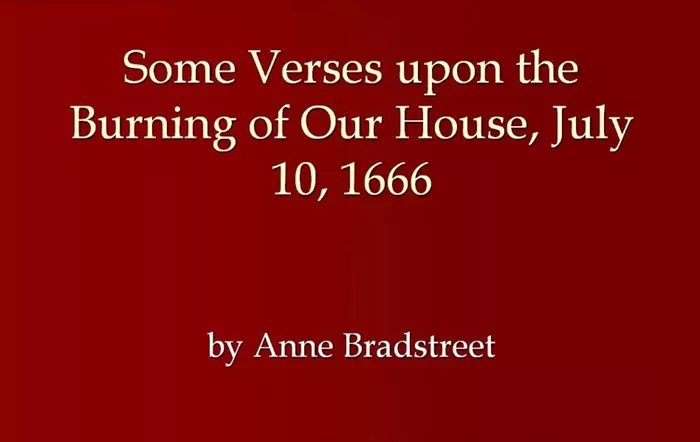Welcome to Poem of the Day – Verses Upon the Burning of Our House, July 10th, 1666 by Anne Bradstreet.
Anne Bradstreet is often celebrated as one of the earliest American poets. Her works reflect her deep Puritan faith and personal struggles. Among her most poignant creations is Verses Upon the Burning of Our House, July 10th, 1666. This poem recounts a devastating event in her life when her home was destroyed by fire. It reveals her initial despair and her eventual acceptance of the tragedy as part of God’s divine will. In this article, we will explore the key themes, structure, and message of this remarkable poem.
Verses Upon the Burning of Our House, July 10th, 1666 Explanation
Background of the Poet and the Poem
Anne Bradstreet was born in England in 1612 and later moved to the Massachusetts Bay Colony. She wrote poetry while managing her household and raising eight children. Her work often dealt with personal experiences and religious reflections.
The poem Verses Upon the Burning of Our House was inspired by a real event. On the night of July 10, 1666, her family home caught fire. Bradstreet recorded her emotions and thoughts in this poem, blending her human grief with her Puritan belief in God’s providence.
Summary of the Poem
The poem is written in first person and opens with Bradstreet describing how she was awakened by a fire in her house. She initially expresses shock and despair, grieving the loss of her possessions and home. As the poem progresses, her tone shifts. She reflects on her Puritan faith, acknowledging that material possessions are temporary.
Bradstreet concludes that everything belongs to God, and it is His right to take it away. She reminds herself of the eternal home in Heaven that awaits her, which far surpasses any earthly dwelling.
Themes in the Poem
The poem explores several themes:
1. Faith in God’s Will
Bradstreet’s Puritan faith underpins the entire poem. She accepts the fire as part of God’s plan, even though it causes her pain. This theme highlights the Puritan belief in submission to divine will.
2. Transience of Earthly Possessions
Bradstreet reflects on the fleeting nature of material wealth. She realizes that her possessions, no matter how precious, are temporary and insignificant compared to spiritual riches.
3. Eternal Perspective
The poem ends on a hopeful note, emphasizing the eternal home in Heaven. Bradstreet contrasts the temporary nature of earthly life with the permanence of divine reward.
Analysis of Key Lines
“I blest His name that gave and took…”
This line captures Bradstreet’s faith. Despite her loss, she praises God for His authority over her life. This reflects the biblical reference to Job, who also blessed God amidst suffering.
“My hope and treasure lies above.”
Here, Bradstreet shifts her focus from worldly possessions to spiritual hope. This line underscores the Puritan emphasis on Heaven as the ultimate reward.
“The world no longer let me love…”
Bradstreet interprets the fire as a reminder from God to focus less on worldly attachments and more on spiritual devotion.
Structure and Style
The poem is written in rhyming couplets with a consistent iambic tetrameter. This structure gives it a rhythmic and reflective tone. Bradstreet’s language is simple yet profound, making her spiritual reflections accessible.
The poem also employs vivid imagery to describe the fire and its aftermath. Lines like “And to my God my heart did cry” convey both the emotional intensity of the event and her reliance on faith.
Message of the Poem
The poem conveys a powerful message about faith and perspective. Bradstreet teaches readers to view personal losses through a spiritual lens. Instead of lamenting her misfortune, she redirects her thoughts to God’s greater plan and the eternal home awaiting her.
This poem is not just about loss; it is about finding solace in faith and focusing on what truly matters.
Conclusion
Verses Upon the Burning of Our House by Anne Bradstreet is a timeless reflection on faith, loss, and spiritual resilience. Through simple yet profound language, Bradstreet transforms a personal tragedy into a lesson on divine trust and eternal hope.
Her ability to reconcile grief with faith is a testament to her strength as both a poet and a believer. This poem continues to inspire readers to find strength in spirituality and to focus on lasting values over temporary possessions.

